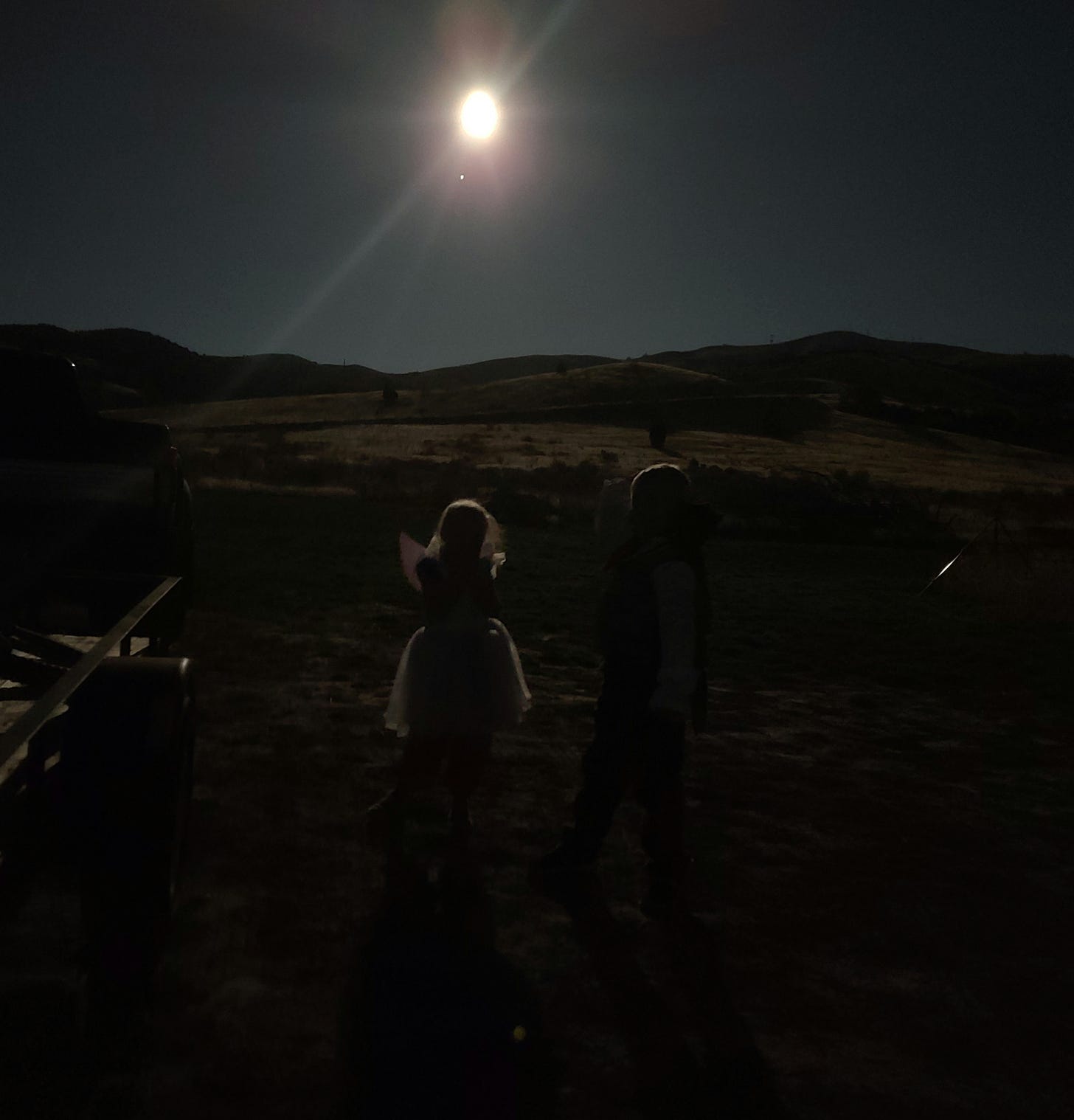COVID: When the cure is worse than the disease
COVID broke many social constructs and exposed others as teetering. Among them is my faith in humanity.

If you are new here, welcome. Howlin’ at the Moon in ii-V-I is experiencing much growth thanks to sharing on Substack and other websites. I am more than grateful and appreciative.
Howlin’ typically hosts two features each week: a column and a video/podcast known as Science Friday. This week, in recognition of COP28, Science Friday will deal with the futility of addressing climate change with most of the mechanisms embraced by the green movement.
Now, let’s talk about what COVID broke.
A few days ago, I came across a consequences of COVID piece, Observations on New Normal, which I found to be quite perceptive. Much of what the author wrote about in this piece has been spinning around in my own noggin for a while, and I daresay many of yours as well. You should read the piece.
It has been my contention since the infancy of the COVID pandemic in early 2020 that many of the solutions being proposed to thwart the spread of COVID just might be worse than the disease itself. I wish dearly that I had been wrong about this. Alas, I was not. COVID broke or exposed, as teetering, many social constructs and institutions. It revealed, to me anyway, a world that may not have a bright future—at least in the short term.
I’d sure like to be wrong about this, but I fear that I am not. To quote the great 1979 film Breaking Away.
Dave: That’s the first time I heard you say anything like that.
Mike: That’s the first time I’ve ever felt that.
The predominant thing that COVID made stunningly apparent to nearly everyone is that an astounding number of “experts” are actually full of shit. Many of the experts calling the shots had agendas that had far less to do with the public welfare they were supposed to responsibly shepherd than with ideological agendas or fealty to money.
I know that’s a lot to absorb. Shall I fan you gently so you don’t go into shock?
“The science” took a huge hit over its bungling of COVID when public official after public official chose their “science” based on ideological parameters rather than rigor and merit. And worse, actively working to engage governments in efforts to suppress legitimate scientific debate that might produce views they disfavored.
I’ve written several pieces about the bad science component of the COVID pandemic, which cuts me, as a physicist, to the bone. You may review some of these here, here, and here. Though I have no training in virology, I do know how to read a graph and interpret scientific data, and a lot of the initial COVID data, upon which momentous decisions were being made, was quite obviously very bad.
Early studies drastically overestimated the likely severity of the COVID pandemic, causing public officials to panic and embrace draconian steps to forestall doom. While I understand the early concerns, which were based on good-faith efforts to parse scant data for trends, I’m disappointed that most of these same people failed to ameliorate their views when the data evolved in such a manner as to suggest that they should. This was to the detriment of us all.
It will take decades for the general public to trust science again, and that reestablishment of trust won’t even begin until we can address the reasons why a lot of 21st-century science has it’s head up it’s own ass.
Government-sponsored attempts to suppress “disinformation,” which in many cases was actually accurate information of which the powers that be merely disapproved, are finally being vetted thanks to the efforts of Matt Taibbi, Michael Shellenberger, Bari Weiss, and others. Our government has always looked for ways around the First Amendment to suppress disfavored narratives, but the pandemic put these efforts on steroids. The Twitter Files made it clear that our government found willing partners in media and social media companies.
I, myself, was suspended and/or had accounts suppressed or labeled as disinformation on social media for claiming that the “lab leak” origins of COVID were far from a wild conspiracy theory. I’m still waiting for an apology, though I suspect I’ll be waiting a while since the same people who were so completely wrong about the pandemic at it’s height now think that amnesty is the best path forward.
Closing schools, hospitals, and other social distancing measures were clearly examples of the COVID cure being worse than the disease. This is not an example of hindsight being 20/20, as many shouted this at the top of their lungs at the time. The problem with the response to COVID is that legitimate concerns about the downsides of the principal tool to address it, social distancing—isolation, depression, learning losses, economic losses, exacerbation of other medical conditions, and a general strain on social order—were either marginalized or completely ignored.
I trust the medical community (well, sort of) to make prudent judgments that prioritize patient welfare. I do not trust them to make prudent judgments concerning issues beyond their realm, like economics, national security, and public safety. It was a huge mistake to not have more voices at the table with gravitas and expertise in a variety of fields beyond medicine when we were crafting policies to deal with COVID, which was rife with profound economic and social implications.
In the fullness of time, I’m confident that allowing the National Institutes of Health (NIH) to lead our response to COVID without sufficient input from other areas of expertise will go down as one of the worst mistakes of the 21st century.
The unnecessary economic losses due to COVID will likely take decades to recover. But the learning losses from schools being closed or operated remotely have proven to be even more catastrophic—so much so that many colleges and universities had to forego normal admission standards for incoming students in order to admit anyone. This, of course, merely perpetuates the problem of learning loss by passing students through an expensive system for which they are ill-prepared by ignoring knowledge every step of the way.
What happens in a few years when those students graduate and enter the workforce? I don’t know, but I shudder to imagine that it can actually be substantially worse than what we are already experiencing in our current age of incompetence.
Schools from kindergarten through higher education took a hit during the pandemic that may forever change the way the public views education. Parents became aware, many for the first time, exactly how much of what was being taught in public schools was driven by ideological agendas rather than sound pedagogy. They saw, with their own eyes, how reading, writing, and arithmetic were subservient to ideological agendas.
Students in higher education discovered that they were spending a lot of money to support an expensive infrastructure that was evidently not required for matriculation, since diplomas were awarded during the pandemic whether anyone attended a class in person or not. The same is true for demonstrating knowledge since many exams, internships, and other tools for evaluation were dispensed with. Put your money down and get your degree. Everyplace in higher education became the University of the Immortal Bird.
In addition to learning loss, younger people suffered from social isolation as well. I think that it’s more than a mere coincidence that the number of school-aged children allegedly suffering from gender dysphoria, a fraction of 1% before the pandemic, increased tenfold in just a few years.
The psychological toll of COVID was hard on everyone, but none more than young people. Children and teens are extremely social creatures, and we allowed “experts” to conduct a huge unsanctioned study on the deleterious effects of social deprivation on this cohort without so much as the routine paperwork required for any university study involving human subjects. Paperwork that I, as a lecturer, was required to submit in triplicate before I could even poll college students on learning outcomes.
Then there was the pandemic-induced decline in work ethic. Once people found out that you could get paid a decent wage without working or even looking for work, many adopted this as their normal ethos. For the past few years, every employer that I know has been forced to hire substandard workers because hardly anyone will apply for a job. They are forced to take the first warm body that walks through the door, then cross their fingers.
This often makes normal activities like going to the grocery store, dining out, or getting something serviced a nightmare since there is a greater than even chance that the employee you are dealing with not only doesn’t know anything but doesn’t care either. And forget about customer service. You might as well jump out of a window to solve your problem.
Many of these issues certainly existed before 2020, but I maintain that COVID made them worse. In many cases, COVID was the straw that broke the camel’s back. And I’m worried that there may be no going back.
The biggest impact of COVID was almost undoubtedly psychological. Even strong, well-adjusted people suffered during the pandemic. But for those who were already predisposed to anxiety, depression, or a host of other maladies, the pandemic was catastrophic.
I know exactly what I’m talking about here since it happened in my own home.
Shortly after the pandemic began, hospitals stopped scheduling routine exams and medical procedures (something that resulted in a large number of “deaths above normal” all by itself) to ramp up for an expected surge in severely ill COVID patients. A member of my own family, a medical professional, was informed on her birthday that she was losing her job even though the hospital for which she worked accepted PPP (paycheck protection program) money for the explicit reason of not having to lay anyone off. This rocked her world.
For this person, who had dealt successfully, for the most part, with depression and bipolar disorder for many years, this was the start of a descent into a vortex from which she may never emerge. I had a front-row seat for all of it. I will not, I assure you, ever forgive those who brought this ruin upon us. You can take that amnesty and put it where the sun doesn’t shine. I’ll be happy to help.
So there you have it. I’ve spent a lifetime believing that humans were intrinsically good and that it was a few bad apples that brought everyone else down. I’ve always been quite sure that the future would always be better. Now, I’m not so sure. To me personally, that’s the lasting damage from COVID—my personal loss of optimism and hope for the future.
It’s not much in the grand scheme of things, but it’s sure been a lot for me.
Associated Press and Idaho Press Club-winning columnist Martin Hackworth of Pocatello is a physicist, writer, and retired Idaho State University faculty member who now spends his time with family, riding bicycles and motorcycles, and arranging and playing music. Follow him on Twitter @MartinHackworth and on Substack at martinhackworthsubstack.com





Martin worse yet the “safe and effective” vaccine seems not to have been effective and also far from safe. And many people were in effect forced to take it without true informed consent.
The country is split along ideological lines - and it became very clear early on which side supported and encouraged all of the lunacy. Many of them still won't question any of this, simply because of their politics.